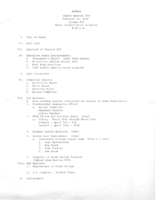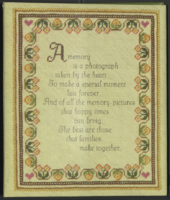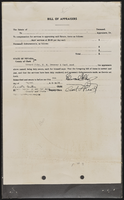Search the Special Collections and Archives Portal
Search Results
Southern Nevada Historical Society Photograph Collection on Basic Magnesium, Inc.
Identifier
Abstract
The Southern Nevada Historical Society Photograph Collection on Basic Magnesium, Inc. contains photographs of the construction of Basic Magnesium Inc.'s plants and buildings from 1941 to 1942. The photographs primarily depict aerial views of the plant site and various buildings, including the administration building, tent camp, chlorination buildings, electrolysis facilities, electrical distribution systems, and warehouses. The photographs also depict Lake Mead and the early buildings in Henderson, Nevada.
Archival Collection

Meeting minutes for Consolidated Student Senate, University of Nevada, Las Vegas, February 28, 1978
Date
Archival Collection
Description
Text

Mabel Hoggard: scrapbook
Date
Archival Collection
Description
From the Mabel Hoggard Papers (MS-00565) -- Personal papers file. This scrapbook contains event programs; newspaper clippings about Mabel Hoggard; photographs of Mabel Hoggard, family, and friends; and letters to Mabel Hoggard. Items include: Mabel Hoggard Elementary School 1981 graduation program; biographical sketch of Mabel Hoggard; "Happenings: successful steps toward school integration: report #1, what's happening in Clark County School?" February 10, 1969; and Westside Council tenth meeting summary, May 27, 1969.
Mixed Content

Transcript of interview with Pauleen Foutz by Don Scott Kaye, February 25, 1980
Date
Archival Collection
Description
Text

Stewart family real estate documents
Date
Archival Collection
Description
Stewart family real estate documents
Text
Harmon Family Papers
Identifier
Abstract
The Harmon Family Papers consist of the political and personal correspondence of Las Vegas, Nevada pioneer Harley A. Harmon from 1910 to 1934, and his son, Harley E. Harmon, from 1950 to 1966. The collection also includes correspondence, personal papers, and photographs of Harley L. Harmon from approximately 1950 to 1999. Also included are family scrapbooks with wedding announcements, photographs, birthday cards, newspaper clippings, and other ephemera.
Archival Collection

Transcript of interview with Frank H. Johnson by George Baker, February 21, 1980
Date
Archival Collection
Description
On February 21, 1980, George Baker interviewed Frank H. Johnson (born July 27th , 1929 in El Paso, Texas) about his occupational history in Southern Nevada. The two discuss Johnson’s career as a journalist for the Nevada State Journal and how he transitioned into his position as a government official. Johnson then recalls problems that arose while he was chairman of the Nevada Gaming Commission. The interview concludes with Johnson speculating about the impact of industrial growth on the environment.
Text

Interview with Robert Nelson, June 30, 2004
Date
Archival Collection
Description
Text

Transcript of interview with Thomas Rodriguez by Maribel Estrada Calderón, September 10, 2018
Date
Archival Collection
Description
Known for “raising hell and making a difference” in the Las Vegas Valley, Thomas Rodriguez has dedicated more than four decades of his life to the political, educational, and social advancement of the Latinx community. Tom was born in 1940 to Jennie Gomez and Joseph Rodriguez in a Topeka, Kansas neighborhood its residents called The Bottoms. Mexicans, Mexican Americans, American Indians, African Americans, among other peoples lived in this diverse and beloved community. In 1956, the Urban Renewal Program, a program funded by the Federal Government that sought to raze neighborhoods the city considered to be “slums,” forced The Bottoms’ residents to abandon their homes. Rodriguez recalled the effects that this event had on his family and on his educational career. Despite his family’s relocation, he graduated from a high school located in a nearby neighborhood in 1958. Years later, the activism and ideology of the Chicano Movement of the 1960s taught Rodriguez that to overcome the injus
Text

Virginia T. Lanier interview, March 16, 1981: transcript
Date
Archival Collection
Description
From the Ralph Roske Oral History Project on Early Las Vegas collection OH-01060. On March 16, 1981, collector Heidi G. Hughes speaks to Virginia T. Lanier at the collector’s home in Las Vegas, Nevada. Lanier talks about living on the Strip in Las Vegas, Nevada in the 1950’s and 1960’s. She speaks about her experiences riding the bus, working in food service, and what the Strip was like during the time period.
Text
